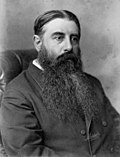A request that this article title be changed to 1875–1876 Pollen ministry is under discussion . Please do not move this article until the discussion is closed. |
The Pollen Ministry was a responsible government which held power in New Zealand from July 1875 to February 1876 while Julius Vogel was in London. [1]








